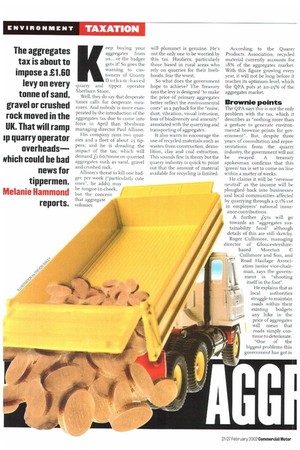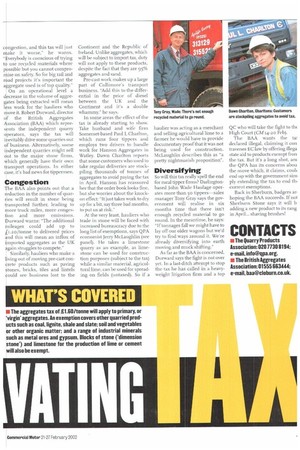The aggregates tax is about to impose a 11.60 levy
Page 42

Page 43

If you've noticed an error in this article please click here to report it so we can fix it.
on every tonne of sand, gravel or crushed rock moved in the UK. That will ramp ip quarry operator overheads Nhich could be had news for tippermen. Melanie Hammond reports.
Keep buying your aggregates from us... or the badger gets it! So goes the warning to customers of County Durham-based quarry and tipper operator Sherburn Stone.
Well, they do say that desperate times calls for desperate measures. And nobody is more exasperated by the introduction of the aggregates tax due to come into force in April than Sherburn managing director Paul Allison.
His company runs two quarries and a fleet of about 25 tippers, and he is dreading the impact of the tax, which will demand /1.6o/tonne on quarried aggregates such as sand, gravel and crushed rock.
Allison's threat to kill one badger per week ("particularly cute ones", he adds) may be tongue-in-cheek, but the concern that aggregate volumes will plummet is genuine. He's not the only one to be worried by this tax. Hauliers, particularly those based in rural areas who rely on quarries for their livelihoods, fear the worst.
So what does the government hope to achieve? The Treasury says the levy is designed "to make the price of primary aggregates better reflect the environmental costs" as a payback for the "noise, dust, vibration, visual intrusion, loss of biodiversity and amenity" associated with the quarrying and transporting of aggregates.
It also wants to encourage the use of recycled materials such as wastes from construction, demolition, clay and coal extraction. This sounds fine in theory but the quarry industry is quick to point out that the amount of material available for recycling is limited. According to the Quarry Products Association, recycled material currently accounts for 18% of the aggregates market. With this figure growing every year, it will not be long before it reaches its optimum level, which the QPA puts at 20-25% of the aggregates market.
Brownie points
The Q PA says this is not the only problem with the tax, which it describes as "nothing more than a gesture to generate environmental brownie points for government". But, despite three years of consultation and representations from the quarry industry, the government will not be swayed. A treasury spokesman confirms that this 'green' tax is set to come on line within a matter of weeks.
He claims it will be "revenue neutral" as the income will be ploughed back into businesses and local communities affected by quarrying through a o.t% cut in employers' national insurance contributions.
A further 1.5m will go towards an "aggregates sustainability fund" although details of this are still sketchy. Roger Cullimore, managing director of Gloucestershire
based Moreton C Cullimore and Son, and Road Haulage Association junior vice-chairman, says the government is "shooting itself in the foot".
He explains that as local authorities struggle to maintain roads within their existing budgets any hike in the price of aggregates will mean that roads simply continue to deteriorate. "One of the biggest problems this government has got is congestion, and this tax will just make it worse," he warns. "Everybody is conscious of trying to use recycled materials where possible but you cannot compromise on safety. So for big rail and road projects it's important the aggregate used is of top quality."
On an operational level a decrease in the volume of aggregates being extracted will mean less work for the hauliers who move it. Robert Durward, director of the British Aggregates Association (BAA) which represents the independent quarry operators, says the tax will inevitably drive some quarries out of business. Alternatively, some independent quarries might sell out to the major stone firms, which generally have their own 1 transport operations. In either case, it's bad news for tippennen.
Congestion
The BAA also points out that a rieduction in the number of guartiies will result in stone being transported further, leading to 1 more truck miles, more conges tion and more emissions. Durward warns: "The additional mileages could add up to f1.2o/tonne to delivered prices and this will mean an influx of imported aggregates as the UK gain struggles to compete."
Similarly, hauliers who make a living out of moving pre-cast concrete products such as paving tones, bricks, tiles and lintels ould see business lost to the
Continent and the Republic of Ireland. Unlike aggregates, which will be subject to import tax, duty will not apply to these products, despite the fact that they are 95% aggregates and sand.
Pre-cast work makes up a large part of Cullimore's transport business. "Add this to the differential in the price of diesel between the UK and the Continent and it's a double whammy," he says.
In some areas the effect of the tax is already starting to show. Take husband and wife firm Somerset-based Paul L Charlton, which runs four tippers arid employs two drivers to handle work for Hanson Aggregates in Watley. Dawn Charlton reports that some customers who used to take regular deliveries are stockpiling thousands of tonnes of aggregates to avoid paying the tax in April. Hanson has reassured her that the order book looks fine, but she worries about the knockon effect: "It just takes work to dry up for a bit, say three bad months, to put us at risk."
At the very least, hauliers who trade in stone will be faced with increased bureaucracy due to the long list of exemptions, says Q PA economist Jerry McLaughlin (see panel). He takes a limestone quarry as an example, as limestone can be used for construction purposes (subject to the tax) while a similar material, agricultural lime, can be used for spreading on fields (untaxed). So if a haulier was acting as a merchant and selling agricultural lime to a farmer he would have to provide documentary proof that it was not being used for construction. McLaughlin describes this as "a pretty nightmarish proposition".
Diversifying
So will this tax really spell the end for rural tipper firms? Darlingtonbased John Wade Haulage operates more than 50 tippers—sales manager Tony Gray says the government will realise in six months time that there isn't enough recycled material to go round. In the meantime, he says: "If tonnages fall we might have to lay off our older wagons but we'd try to find ways around it. We're already diversifying into earth moving and muck shifting."
As far as the BAA is concerned, Durward says the fight is not over yet. In a last-ditch attempt to stop the tax he has called in a heavyweight litigation firm and a top
QC who will take the fight to ill( High Court (CM Let-2o Feb).
The BAA wants the ta: declared illegal, claiming it con travenes EC law by offering illega state aid to products exempt fron the tax. But it's a long shot, an the QPA has its concerns abou the move which, it claims, cold( end up with the government sim ply extending the tax to end Eh, current exemptions.
Back in Sherburn, badgers ar hoping the BAA succeeds. If noi Sherburn Stone says it will b adding a new product to its rang in April... shaving brushes!






















































































































































